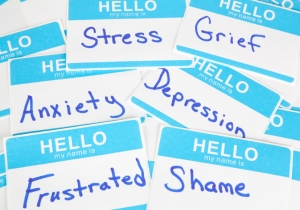Out of all the things we can do to ourselves, self pity is the most destructive. It’s the opposite of anxiety. Instead of worrying about everything outside of your control, you rather give up and blame that instead of trying. The worst kind of self pity is where we are quick to blame ourselves but not willing to forgive ourselves and try to move on. Taking personal responsibility in your life in one thing, but taking all the hits on the chin as if you deserved it is another.
Self pity is not a poisonous acid like pride or greed. It is more like a river slowly carving away the rock. It whittles down your character so slowly you do not even realize it is happening until it is too late. It will destroy relationships and all that is good in your life. It will fulfill all the negative prophesies it makes then leave you alone to wallow in your misery.
It becomes easy to play the “what if” or the “if only” game with self pity. The spiral downwards starts with thinking of how hard done by you are. You think of how unfair it all has become. You begin to hate yourself or the world because you never had this opportunity or that. Stephen Fry once said if he could publish a self-help book the first page would be “Stop feeling sorry for yourself and you will be happy”. Its really simple but really hard to do at the same time.
It may be a natural reaction to life when you are at the bottom of a deep dark hole. I have been there and life then threw me a shovel and said “get digging”. Yes things can always get worse but they do not stay that way forever. Even suffering can end with death. Nothing is infinite. Self pity is the enemy of opportunism. You feel you are never given the chances you need to make it in this world. You feel that when you have the opportunities that “it came at the wrong time” or you “don’t have what it takes”.
Stopping self pity can be very difficult. You have to find a reason why you feel good enough to deserve what you want, and then you still have to persevere in order to reach your goals. Regardless of the situation you are in, you cannot believe you are the unique little precious snowflake that the world is hell-bent on destroying. Life is never fair, EVER! You can only increase the odds in your favour through passion and determination. And EVEN then, you will still fail many times before succeeding. Edison himself said he never failed at making the light bulb, only found many ways that it wouldn’t work.
The first thing you need to shake off is the belief that you “deserve” anything. You technically only have a limited list of human rights. Many countries still do not have half of the freedoms you take for granted. But freedom always comes with responsibility. Your freedom to movement can be taken away if you kill someone for example. The state will lock you away for many years after one little act. You cannot take anything for granted, you do not deserve anything, the world owes you nothing and everything can always change.
Don’t let anyone tell you to simply “cheer up”. Self pity is not melancholy. You don’t just start smiling more and the problem goes away. NEVER allow anyone to tell you that you need to get over yourself because someone else out there has it worse. It’s the same as someone coming to you when you are happy and saying “You can’t be happy because some else has it better”. Its an unfair comparison to make. Just because you have a problem does not make it unique. But just because it is a common problem, it does not make it less of an issue.
Nobody can make you react to a situation in a certain way. Yes they can create a scenario that may illicit a certain range of responses but they cannot make you respond in any specific way. Hidden camera prank shows are enjoyable because of that. You provide a situation which you believe will produce a range of humorous results but you never know what that person will actually do.
Just like the case with anxiety, you can only control the world within your reach. The first thing you can have major control over is the emotions and thoughts running through your mind. You can decide “how” you will react to the things around you. You can never decide “what” happens. Even if you choose a path to be a lawyer or a drug dealer, you could still get mugged and killed. Sure you need to make wise choices as they can change your overall direction in life. BUT the specifics of whom you meet and the places you will go are largely out of your control.
Once you accept that your control and influence over life is limited, you can get down to the business of getting what you really want. A famous sports star did not become famous because they tried to be. They cannot make you like or hate them unless they go out of their way to do so. A sports star practiced many hours and focussed on the game before hitting the big time. They earned their place by controlling the world within their grasp. If some kid in China now begs his parents for your action figure you did not make him do that. Differentiating between what you can or cannot change will allow you to make the steps needed to get to your goal.
Related articles
- At 17, Jean was paralysed in a fall from a horse. The last thing she wants is your pity (belfasttelegraph.co.uk)
You do not get opportunities, you make them.
You have to learn a few key things in order to let go of self pity. Once you can do that, there will be no more “what if’s” and “if only’s” in your life.
- You are no precious gem or rare little treasure. Life itself is precious however, don’t forget that. In the entire current known universe we are the only planet with any life at all. So what we have here and now is important and needs to be protected. BUT you are replaceable in a second. It only takes one minor accident for all humans to be wiped out. There are a million ways to die but only a few ways to live a meaningful life. Your legacy will only live on if you made the right kind of impact on those around you. At the end however, no matter how great you are eventually you too will be forgotten.
- It is better to live not believing in heaven or hell. That way you would actually understand how important it is for you to live well now. There is no redemption or punishment. There is no “do-over” button. You would care far more not only for yourself but for others too if you truly understood and accepted this as your one and only existence. If you could come to grips with the utter briefness of our lives you’d then grasp every opportunity that you could. When you do not find the opportunity you want then you’d willingly make your own.
- Failure will happen. Maybe not now or maybe not the kind of failure that ruins an entire project/event. If you can accept that then you will be more willing to do the right preparation to avoid it. If disaster does strike then you will acknowledge it and be able to move on faster.
- Self pity will destroy you. You are allowed to feel sad, upset or angry. It is reasonable to hate how unfair life is. But you cannot internalize that as the self-pity it normally becomes. If you can understand the destructive nature of your unchecked thoughts and emotions you can avoid it all together. Do not start down the road if at all possible. But if you are already in some hole wallowing in your own tears then it is never too late to get out. All you need to do is understand you do not “deserve” anything, good or bad. You only get what you get, and that can only be shaped as far as your reach extends. Self pity is an emotive response that you can choose to have. You may not choose what happened to you but you decide how you react to these events.
Related articles
- Why you must not dwell in the past (creativebusinesssuite.wordpress.com)
Anxiety and self pity are brothers and best friends. Often one ever goes to the party without the other. Both of them have the same mother, self loathing. When you hate yourself it is hard to find reasons why you believe you should go out and get what you want. If you hate yourself you do not think yourself worthy of the challenges set before you. You cannot do anything because self-loathing beats you into a corner while self-pity holds your arms down. Anxiety is just the crowd cheering for your loss. Learn to recognize the signs of you losing control over your thoughts and emotions.
Here are some things you will work on if you are prone to feeling sorry for yourself:
- Find a reason to feel adequate in some aspect of your life. This usually comes from a consistent and constant effort in practising or carrying out a task.
- Learn to trust your own judgement. Begin making more of your own choices.
- Take responsibility for your own life and the outcome of your actions.
- Learn about being self-confident and foster that attitude in all aspects of your life.
- Don’t shy away from something just because it appears difficult.
- Surround yourself with people who will understand and appreciate you.
- Learn how to stand up for yourself.
Related articles
- Grief? Self-Pity? Complain? (shelli1963.wordpress.com)
- Pity party….table for one (polysyllabicprofundities.com)


